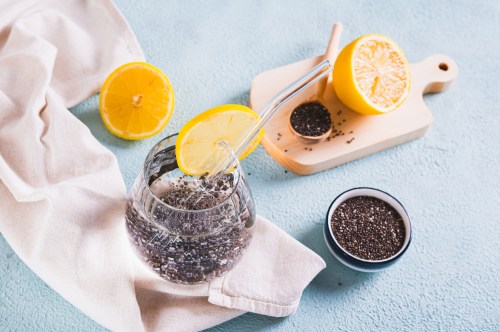Our editors independently select these products. Making a purchase through our links may earn Well+Good a commission
Avocados are often deemed a food staple—whether they’re eaten smashed onto some whole grain toast, as guacamole, or on their own with a pinch of salt—it’s nearly impossible to go wrong with a serving of this delicious fruit. The best part? Avocados aren’t just tasty; they’re packed with boatloads of nutrients, too, which has led them to earn their rep as a gold standard for healthy fats for good reason.
Experts in This Article
health coach and author of Peace of Cake
“Avocados are full of properties that help eliminate toxins and inflammation stuck inside your tissues, contain healthy omega-3 fats that support the absorption of nutrients and minerals through the cell walls, and are high in fibers that help to bind toxins in the gut so you can eliminate potentially harmful consequences due to everyday foods, stress, and environmental toxins,” says health coach Jenny Carr, author of Peace of Cake: The Secret to An Anti-Inflammatory Diet.
That said, not everyone is a fan of this (pricy) produce or its bright green creamy flesh for one reason or another. In which case, finding the perfect avocado substitute may be top of mind. Ahead we delve into seven of the best avocado substitute options we can’t get enough of that are equally as nutritious and delicious, and likely a fraction of the cost of a medium Hass ‘cado.
So, why opt for an avocado alternative?
For some folks, it’s the taste they can’t stand. For others, it’s the texture. Not to mention, it can take what feels like an eternity to ripen an avocado. On the flip side, it can have little to do with taste or texture (or even patience), as some folks are better off not eating the fruit altogether. That’s because noshing on avocado can cause gastro-related distress when consumed in higher quantities for some people. Or in more serious cases, some folks can have an avocado allergy, resulting in itching and/or swelling of your lips, tongue, throat, or face in general, otherwise known as oral allergy syndrome (OAS). And, unfortunately, research shows that avocado allergies are fairly common and might be why avocado causes you an upset stomach. (Plus, if you’re already allergic to latex, it’s not uncommon to develop an allergy to avocados at some point, as well as to bananas, kiwi, chestnuts, and papaya. Sigh.)
That said, even if you can eat avocados, it’s never a bad thing to cut down once in a while (especially for the sake of your wallet!). It’s also worth noting that according to Michigan State University, the high demand for avocados year-round in the U.S. has made farmers in Mexico up the sizes of their farms, causing deforestation issues in some cases and leading to increased greenhouse gas emissions.
Avocado basics
An avocado is a medium-sized fruit (no, it’s not a nut or vegetable) with a large pit in the center that’s surrounded by bright green flesh. Its skin can either be smooth and dark green or dark and leathery, depending on the variety.
Avocados are considered ethylene producers (aka they emit a plant hormone that triggers the ripening process). This is why you may notice that they have a rather short lifespan once harvested compared to other fruits like blueberries or strawberries that aren’t sensitive to ethylene.
What can I substitute instead of avocado?
When looking for an avocado alternative that replicates the nutritional value and some of the mouthfeel of an avocado, you’re going to want to look for an ingredient that contains (or, more often than not, is served with) healthy fats. Specifically, monounsaturated fats, which can help improve cholesterol levels and give it that rich and creamy texture ideal for making avocado toast or a medley of other avocado recipes.
Fortunately, many avocado substitutes can offer similar benefits. So, if you’re not fond of or can’t consume this fruit, other foods with healthy fats include: organic extra virgin olive oil, walnut oil, almond oil, macadamia oil, unrefined sesame oil, tahini, flax oil, hemp oil, nuts and seeds, butter (from pastured grass-fed cows, goats, or sheep), olives, and other plant sources of fat.
What can I use instead of avocado for breakfast?
Finding the perfect avocado substitute isn’t exactly easy. Of the aforementioned options, we’ve found that only a few ingredients either share similar flavor profiles as the fruit or have comparable nutritional value. In terms of texture and nutritional benefits, edamame, tofu, hummus, nut butter, bananas, chia seeds, and pesto are all excellent avocado alternatives. Ahead we delve into the specifics of each one.
Ahead, seven healthy avocado alternatives that’ll help fuel your day—plus, why they’re comparable in terms of flavor, texture, nutrition, or all of the above.
7 delicious avocado substitute options
1. Pesto
If you love the texture of ooey gooey avocado, pesto is a solid replacement. “Similar to mashed avocados, pesto gives that rich, moist, and oily texture that’s full of flavor,” Carr says. Plus, since it’s typically made with basil and pine nuts, you’re getting plenty of vitamin A, iron, magnesium, protein, and healthy fat (with a similar texture as regular ol’ avocado). Carr also recommends using anti-inflammatory extra virgin olive oil whenever possible.
How to use it: Carr recommends putting pesto, like this delicious spinach pesto recipe, on your gluten-free toast or in a quinoa pasta salad.
2. Nut butter
One of the most satisfying toast-toppers—aside from avocado, of course—is nut butter. There are plenty of different options—whether that’s almond, cashew, regular ol’ peanut—and each of them will give you a good amount of protein and healthy fat, à la avos.
How to use it: Spread nut butters with high protein on whole grain toast or an English muffin, or add it to your oatmeal or smoothies.
3. Hummus
Sorry, avocados, but hummus might give you a run for your money in the dipping department. “Many people love to dip their chips or celery sticks into a beautiful bowl of guacamole,” Carr says. “If avocados are a no-go, then hummus is the perfect swap for that creamy, satiating, and tasty treat. Plus, it gives you a nice dose of a plant-based protein.”
How to use it: Dip your veggies in it, smear it onto toast, or use it in your sandwiches in place of avocado slices, says Carr. Or, check out these alternative hummus recipes (made without chickpeas, nor avocado).
4. Bananas
Thanks to banana’s texture, it’s the perfect fruit-filled substitute for creamy avocado. “Like avocados, bananas offer smoothies a smooth texture and consistency. And they even deliver a perfect dash of added sweetness,” Carr says. Plus, looking for a snack to help you unwind? Bananas for sleep are the way to go, thanks to their high potassium and magnesium content.
How to use them: Put it in your smoothie paired with some of your other favorite high-protein fruits, add them into your oatmeal, or turn them into nice cream.
5. Chia seeds
Chia seeds might not be similar to avocados on a taste or texture level, but they definitely are health-wise. “Avocados are high-fat, high-fiber foods. If you’re looking for a food swap with similar nutritional values, your best option are chia seeds,” Carr says. “Similar to avocados, chia seeds have inflammatory fighting omega-3 fats, and they happen to be one of the most fiber-rich foods. And an added bonus: They even come packaged in a complete protein.”
How to use them: Make some chia seed pudding or add them into your smoothie bowls.
6. Silken Tofu
Tofu, a soybean product, is made from condensed, unfermented soy milk that’s been processed into solid white blocks. Though it can come in different variations, like firm and soft, we find that silky tofu tends to have a similar consistency to a perfectly ripe avocado. Tofu has about eight grams of protein per 100-gram serving and has a neutral flavor that can be doctored up with some of your favorite avo-friendly ingredients like everything bagel seasoning.
How to use them: Here are eight delicious tofu recipes, including a creamy tofu fettuccine Alfredo.
7. Edamame
Of course, one of the best parts about eating an avocado is the vibrant green color. But when searching for a good substitute for this mighty fruit, it’s tough to find suitable counterparts that have the same hue. Enter edamame. Aside from being visually stunning, this soybean is packed with loads of health benefits, including tons of protein, every single essential amino acid, and loads of vitamins, like vitamin K.
How to use them: Try this silky green apple edamame smoothie recipe for breakfast.
Surprising health benefits of avocados, according to a registered dietitian:
Sign Up for Our Daily Newsletter
Get all the latest in wellness, trends, food, fitness, beauty, and more delivered right to your inbox.
Got it, you've been added to our email list.











